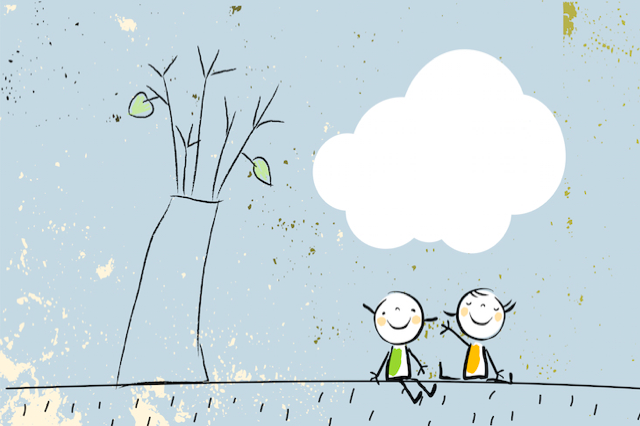
“If you judge people, you have no time to love them.” ~Mother Teresa
I kept thinking about how many years had passed by. Did I really waste four years by not contacting my best friend?
You see, I had a falling out with my close cousin. Growing up together since childhood, we became best friends—more like brothers through the years.
That was until we had a huge disagreement. We didn’t speak for what seemed like forever.
Admittedly, I was the one to blame. Though at that time, I didn’t see it that way.
When someone means a lot to you and then disappears, it leaves this huge void in your life—and possibly all because you couldn’t admit any wrongdoing. It’s something you can’t sweep under the rug so easily.
During that time, I wondered what he was up to. Should I try to contact him? It had been so long, I didn’t know if I should even try any longer.
Sometimes we take a sole stand, even if it’s against close friends. Maybe we won’t budge because we know we’re right (or refuse to admit we’re wrong). And if we can’t make sense of it all, maybe we wonder if we should let it be.
After four long years, our paths crossed once again. I heard he wanted to get in touch with me. I felt the same and was eager to finally meet up and talk in person.
It just so happened he also wondered how I was and what I was up to. After our talk, it’s like we never lost a beat. We took some time to bring ourselves up to speed, but we ultimately fixed our friendship.
Reflecting on my experiences taught me some valuable lessons about how to fix friendships. These may work for you too, if you apply them wholeheartedly:
1. Let the dust settle first.
If the argument was recent, allow some time for the psychological wounds to heal. If you do anything now, you may cause more harm than good.
Tempers flared, and hurtful things were said. Let both of you gain your senses first and reflect on what happened.
If you get back into the mix too soon before you’ve both had a chance to cool off, you risk experiencing a repeat episode of the same argument.
Time is your ally, so wait a while.
2. Purge your frustrations.
Frustrations can and will arise from time to time, so you’ll need an outlet to release stress and keep them from accumulating. Otherwise, they may undermine your good intentions.
Sometimes you’ll feel the need to vent and validate your hurt feelings, and that’s okay. It’s not healthy to hold your feelings in and pretend you’re okay, so vent away.
But at the same time, don’t badmouth your friend to anyone who’ll listen. Instead. Limit your diatribe to just one person you can confide in and trust.
It’s actually about working through your feelings. Talking out loud about your frustrations not only can make you feel better but can also give you more focus and perspective in the rebuilding process.
3. Give your ego a break.
An ego may have good and bad parts, but one thing’s for certain:
The ego is a projection of how we want people to see us. Sometimes, we go out of our way to protect this projection, but this costs us, because we often don’t allow ourselves to be vulnerable.
When attempting reconciliation, both your egos are just additional obstacles both of you have to bore through to make meaningful communication between your pure selves.
Remove any defensiveness you’re harboring and open your heart, exposing your vulnerability.
Face your fear of unpredictability even if you don’t know if your friend will accept or reject you.
Keep in mind that your friend needs to vent as well; you must mentally prepare yourself to listen to whatever opinions are thrown your way.
Lastly, be mindful not to criticize, judge, or complain. These will definitely close the doors to communication. Be sure to keep an open mind.
Your goal, by withdrawing your ego, is to get your friend to withdraw their ego as well and open up, thus removing barriers in order to reconnect.
4. Don’t be afraid to reach out first.
Get over that initial hump. It’s not as difficult as it appears.
Want to email them? Don’t be afraid to push that send button. That button won’t bite you back.
Afraid they won’t reply to you? You haven’t spoken to them for a while anyway, so what’s to fear?
Be fearless, take the leap, and go for it. Go ahead and find a way to contact them. Believe me, you’ve got absolutely nothing to lose, because your current situation can’t get any worse.
5. End the blame game once and for all.
Still figuring out who’s to blame? That means you’re still dwelling in the past.
Blaming something on anyone brings back up your fighting stance. Definitely counterproductive in fixing any relationship.
Accept the situation for what it is even if it doesn’t make any sense at the moment.
No one’s perfect in this world, and the last thing you want to do is stir the proverbial pot when trying to fix your friendship.
Find a way to climb on top of that and gain the advantage of seeing over your obstacles.
6. Visualize forgiveness before you utter a single word.
Whatever wrongdoings your friend has committed against you, picture yourself forgiving them, and envision those misdeeds dissolving into nothingness. Let this mindset envelope your soul right before you speak.
It’s like a golfer visualizing the ball moving through the green into the hole. He has his predetermined path planned in his head leading to his goal. All this visualization before he’s even putted the ball.
By foreseeing your goal, you’ve already set the right tone from the get-go.
Whatever the outcome, good or bad, you want your friend to know your intentions originated from peace, not hate.
7. Apologize for your part in what happened.
Saying sorry not only eases their pain but also shows that you’re giving a peace offering to the other side.
Even if you don’t feel you’re at fault, please know you still had some part to play in the fight.
Say sorry for anything incidental. For example, you took so long to contact them, or you weren’t able to hear their side of it.
8. Avoid asking “Why?”
Why is a tiny three-letter word that can cause more damage than good. When asking “Why?” you’re pretty much pinning them in a corner and making them feel trapped.
It’s like saying, “Explain yourself; you’re guilty!” They’ll get defensive, shut down, or stay silent.
You can change the question around so that it shows you care rather than appear demanding. Instead of asking, “Why did you act like that?” say, “Did I do anything that made you feel like you had to defend yourself?”
Asking it this way seems less confrontational and more inquisitive.
9. Avoid trying to force reciprocity.
If they’re the perpetrator, don’t feel entitled to an apology, and don’t fish for feedback.
Expecting something brings your ego back into play. It may cause unnecessary tension and create false expectations that can hinder any improvement.
Also, it’s possible they may never come around and may never be sorry at all. This is about unconditional love by giving only from your point of view, so it’s best to not expect anything in return.
If they truly wish to make it work, they’ll come around to explain their reasoning and let you know they’re sorry.
Doing it this way allows them to learn and grow themselves.
10. Be prepared to move on.
This is all about creating peace. However, if after all that you’ve done it does not come to fruition, don’t despair. Know in your heart that you’ve taken the initiative and freed yourself from guilt.
Why? Because you did everything you could possibly do. Now the ball is in their court.
Don’t burn any bridges and keep that door open to friendship, but use your best judgment. If you’re treated horribly or abused, after all of your best intentions, then it would be in your best interests to close that door.
Make That Friendship Even Stronger Than Before
The positive thing coming out of breaking and fixing a friendship is that both of you know each of your boundaries once you have crossed them.
It’s like playing with fire and getting burned.
You now know what not to cross, but at the same time, you’ll have a closer connection from having experienced it. A deeper understanding you couldn’t get any other way.
Your fixed relationship is sort of like an irreplaceable, cracked heirloom vase carefully glued back together. It may not look the same as it did before, but you can still value it for what it is and fully embrace it for what it represents.
One thing that I know for sure: if you value this friendship, the time you lose with them can never, ever be replaced. Life is short, and the clock is ticking.
Get the ball rolling. Make a conscious choice now. Remember, you have nothing to lose and only a friend to gain.
Friends image via Shutterstock
About Perry Manzano
Perry Manzano is a personal growth blogger. His website, Transform Stress Into Calm is for folks searching for an illuminated path out of their anxiety-filled world.













 Though I run this site, it is not mine. It's ours. It's not about me. It's about us. Your stories and your wisdom are just as meaningful as mine.
Though I run this site, it is not mine. It's ours. It's not about me. It's about us. Your stories and your wisdom are just as meaningful as mine.